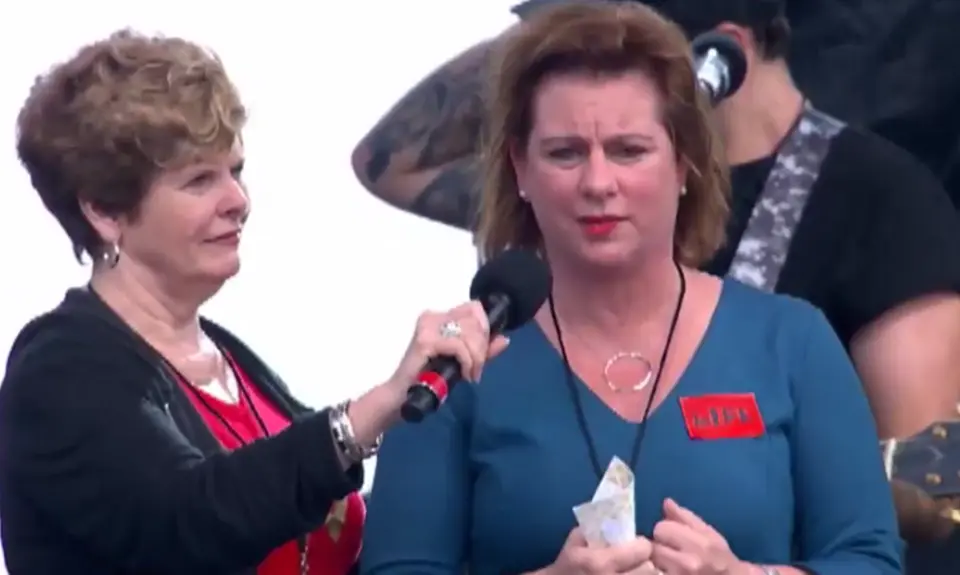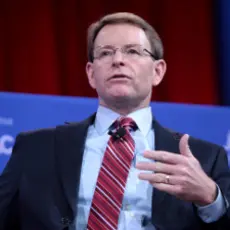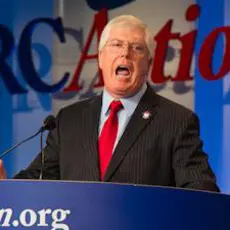Anti-choice leaders are “ecstatic” about Justice Anthony Kennedy's resignation because they see it as the moment of triumph in their campaign to “eradicate” Roe v. Wade and criminalize abortion in America.
Religious Right leaders spent decades telling Christian Americans that the moral character of their leaders was vitally important. In 2016, they abandoned that principle, telling conservative Christians that they had to vote for Donald Trump no matter how flawed his character, because he had promised them judges who would vote to overturn Roe v. Wade and embrace the Religious Right's weaponized version of religious liberty.
During the presidential campaign, even Religious Right leaders who had qualms about Trump's character or his divisive attacks on immigrants, like Hispanic evangelical Samuel Rodriguez, told voters that getting anti-abortion judges was more important than anything else.
Since the election, leaders of the “intercessory prayer” movement have been praying that God would remove multiple Supreme Court justices, clearing the decks for Trump nominees and a "massive shift" on the court. And Religious Right activists have been delirious with excitement over the confirmation of Supreme Court Justice Neil Gorsuch and the other anti-choice judges Trump and Senate Republicans are packing onto the federal courts at a record pace.
Last fall, Marjorie Dannenfelser, president of the anti-choice Susan B. Anthony List, said, “If we can get even one more like Neil Gorsuch, we're talking about overturning Roe v. Wade.” In January, Family Research Council Executive Vice President Jerry Boykin told supporters that with another justice like Gorsuch “we can finally overturn Roe v. Wade and end abortion in America once and for all!” And in May, Liberty Counsel's Mat Staver, who represented former Alabama Chief Justice Roy Moore, said that “literally we are a few months away” from ensuring that Roe would be overturned. Staver has said that justices who support Roe should be impeached.
Trump's support for Moore's Senate bid was a sign that his administration embraced anti-choice extremism. Moore had bragged of his support from Matt Trewhella, who has called the murder of abortion providers “justifiable.”
In January, attorneys with the Alliance Defending Freedom, a legal giant that racked up a series of Supreme Court victories this year, bragged about their strategic plan to “eradicate” Roe v. Wade by passing ever-more draconian restrictions and outright bans on abortion at the state level and getting those cases in the pipeline to the Supreme Court.
In May, the Family Research Council's Tony Perkins celebrated the passage of an Iowa “heartbeat” bill that would criminalize abortion as soon as six weeks after conception, saying that he anticipated a “change in the court” brought about by a retiring justice that could win Supreme Court approval for Iowa's ban. Earlier this year, Rep. Steve King pushed congressional Republicans to pass a federal version of the bill, saying Kennedy would be retiring and it was time “to plan for a #ProLife Supreme Court.”
What would the Court overturning Roe v. Wade mean?
At the very least, abortion would be immediately criminalized in a number of states, and legislative battles would break out across the map. But while anti-choice organizations are preparing for a “50-state battlefield” after Roe, that's not their ultimate goal. They want to make abortion illegal everywhere and they will not rest when some more progressive states move to protect women's rights.
Dannenfelser, who led candidate Trump's “pro-life coalition,” has called exceptions in abortion ban legislation for cases of rape “abominable.”
The “personhood” movement within the anti-choice movement calls for Congress to pass a resolution holding that a fertilized egg is a person from the moment of conception whose rights are protected under the 14th Amendment to the Constitution, which would mean a nationwide ban. Sen. Ted Cruz is one politician who “absolutely” believes Congress could do that kind of end-run around Roe without amending the Constitution. In December 2016, the National Pro-Life alliance reported that as a candidate, Trump had pledged his support for a federal “personhood” bill. Trump's first Secretary of Health and Human Services, Tom Price, had co-sponsored such legislation in 2005 and 2007.
Roy Moore's protege Tom Parker, now the Republican nominee for Alabama Chief Justice, has said state courts should lead defiance of Supreme Court rulings on abortion and LGBTQ equality; beyond that he is using his opinions to call attention to a growing body of laws that grant legal protections to zygotes and fetuses in order to build support for the “personhood” principle.
Back in 2016, while the Republican primary campaign was still under way, Trump said that when abortion is criminalized, there must be some punishment for women to get abortions. The anti-abortion movement went into full crisis-PR mode denying that is the case, with one leader flat-out declaring “No pro-lifer would ever want to punish a woman who has chosen abortion.”
That, of course, was a lie. A couple years ago, Personhood USA cheered the attempted murder prosecution of a Tennessee woman who tried to give herself an abortion. Matt Trewhella complained last year that elected officials weren't willing to prosecute women who have abortions for homicide. And as part of Parker's campaign to establish fetal personhood, Alabama has used “chemical endangerment” laws to prosecute hundreds of women.
The anti-choice movement's preferred self-description is “pro-life,” but there's a huge disconnect between its “pro-life” rhetoric and reality. In March, Mississippi Gov. Phil Bryant signed a 15-week abortion ban, saying he wanted Mississippi to be the “safest place in America for an unborn child.” Well, how about making it a little safer for women and children? Bryant's state ranks 50th in the nation in the health of women, the health of children and the health of infants—and 1st in child mortality.
In spite of the anti-abortion movement's “pro-life” misnomer, banning abortion will have deadly consequences for American women, whose maternal mortality rate is already the highest in the developed world. Earlier this year, the Washington Post's William Wan reported on research documenting that the best way to reduce abortion rates is not to restrict abortion but to prevent unintended pregnancies with the use of contraception. “In countries where abortion is most restricted, Wan wrote, “the procedure is much more dangerous for women.”
“It's not hard to see what a pro-life world looks like,” wrote Jennifer Wright in Harper's Bazaar last year. “It looks like a world with a lot of dead women in it.”









